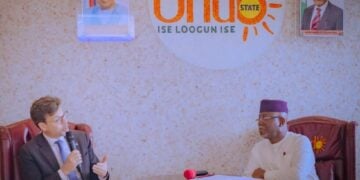Founder and CEO of Pharmaplus Nigeria Limited, Pharma. Ahmed Ibrahim Yakasai has taken a monumental step toward advancing girl child education with the launch of his book, ‘The Pharmaceutical Industry and Drug Production in Nigeria.’
The high-profile event targets raising an impressive N500 million, all of which Yakasai pledged to dedicate to rehabilitating schools, improving infrastructure, and advancing education for girls in his community in Kano state while giving his welcome speech at the book launch on Thursday in Lagos.
Yakasai revealed that the journey of writing the book began following a challenge from the late chief of staff to President Muhammadu Buhari, Alhaji Abba Kyari, to develop a comprehensive strategy for boosting Nigeria’s pharmaceutical industry and achieving self-sufficiency in drug production.
His commitment to addressing the challenges in the sector led him to consult with key stakeholders, research global best practices, and present the findings during his time at the National Institute for Policy and Strategic Studies (NIPSS).
The author of the book, Yakasai, therefore, called on young pharmacists, industry leaders, and policymakers to join him in igniting a new era of innovation and growth in local drug manufacturing while praising the Nigerian Sovereign Investment Authority’s recent plans to invest in the pharmaceutical sector, describing it as a step in the right direction.
Reviewing the book, the chief executive of Business School Netherlands Nigeria, Prof. Lere Baale, said the book delves into Nigeria’s reliance on imported drugs and proposes solutions to promote local manufacturing has been hailed as a critical contribution to knowledge. “It highlights lessons from countries like India, Indonesia, Malaysia, and Pakistan, emphasising the need for Nigeria to increase its domestic drug production capacity, which currently accounts for only 30 per cent of the nation’s needs. The book’s launch was not just a celebration of Yakasai’s literary accomplishment but a testament to his commitment to societal progress and the empowerment of the next generation,” Baale averred.
In his remarks, former minister of Health, Prince Julius Adelusi-Adeluyi, urged Nigerians to embrace industrialisation as a pathway to breaking free from the constraints of third-world status while emphasising the urgent need for a shift towards self-sufficiency in drug manufacturing. “The golden rule in business is that he who has the gold dictates the rules. That’s why many nations are dictating to African nations. Nigerians must re-enter the industrialisation circuit, or we risk remaining in the third world,” he said.
Adelusi-Adeluyi described the book as a vital tool to inspire pharmacists and policymakers to tackle the challenges of the pharmaceutical sector and champion local production. Drawing comparisons to India’s pharmaceutical successes, Adelusi-Adeluyi highlighted the disparity between Nigeria’s 430 struggling manufacturing units and India’s 3,000 thriving drug companies. He called for policy and leadership commitments from the top, urging stakeholders to use the book as an incentive to create sustainable solutions.
The director-general of the National Agency for Food and Drug Administration and Control (NAFDAC), Prof. Mojisola Adeyeye, also underscored the significance of local drug production, sharing insights into the agency’s “5 plus 5” policy. The initiative requires importers to transition to local manufacturing within five years, a move that has already bolstered the capacity of Nigerian pharmaceutical companies. Prof. Adeyeye emphasised the importance of producing high-quality drugs that meet international standards, asserting that local API production could reduce dependence on imports and boost employment.
Former governor of Kano state, Senator Ibrahim Shekarau, lauded the book as a timely reminder of Nigeria’s potential. He stressed the need for correct leadership to formulate sound policies, stating, “When we get the correct leadership that will bring the correct policies, citizens will be encouraged to make the needed changes.”




